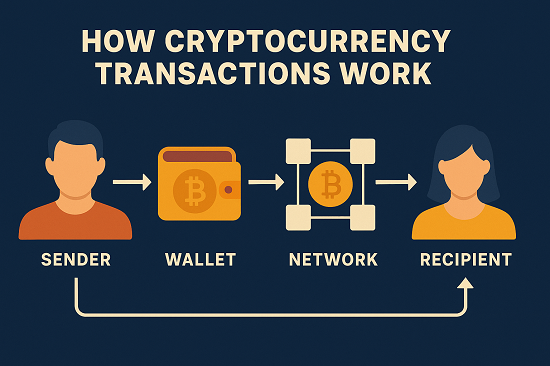Cryptocurrency has revolutionized the way we think about money, offering a decentralized and transparent system for transferring value. Whether you’re new to digital assets or just want to understand the crypto transaction process, this guide breaks down exactly how cryptocurrency transactions work, step by step.
What Is a Cryptocurrency Transaction?
A cryptocurrency transaction is a digital transfer of value between two parties over a decentralized network called the blockchain. Unlike traditional bank transfers, crypto transactions don’t rely on intermediaries, making them faster, often cheaper, and more transparent.
Step-by-Step: How Cryptocurrency Transactions Work
1. Initiating a Transaction
Every crypto transaction starts with a sender who wants to transfer coins or tokens to a recipient. To do this, the sender uses a wallet—a software or hardware tool that holds private and public keys.
- Private key: Like a password that lets you authorize transactions.
- Public key: Your crypto address—what others use to send you coins.
The sender enters the recipient’s wallet address, specifies the amount, and signs the transaction using their private key.
2. Broadcasting to the Network
Once signed, the transaction is broadcasted to the cryptocurrency’s network (e.g., Bitcoin or Ethereum), where it’s picked up by nodes—computers that maintain a copy of the blockchain.
These nodes validate the transaction to make sure:
- The sender has enough funds.
- The digital signature is correct.
- There’s no double-spending attempt.
3. Transaction Verification and Mining
Next, the transaction enters a pool of unconfirmed transactions known as the mempool. Miners (in Proof-of-Work systems like Bitcoin) or validators (in Proof-of-Stake systems like Ethereum 2.0) then:
- Select transactions from the mempool.
- Bundle them into a block.
- Solve complex algorithms to validate and add the block to the blockchain.
Once this happens, your transaction is confirmed and becomes part of the permanent blockchain ledger.
4. Confirmation and Finalization
After a transaction is included in a block, it receives its first confirmation. Each new block added on top increases its confirmation count. For example:
- Bitcoin is considered secure after 6 confirmations.
- Ethereum might only need 1–2.
More confirmations = Higher security.
Why Are Cryptocurrency Transactions Secure?
Cryptocurrency transactions are highly secure due to:
- Encryption: Strong cryptographic algorithms protect data.
- Decentralization: No central point of failure.
- Immutability: Once confirmed, a transaction cannot be changed.
This makes fraud or tampering nearly impossible without controlling the majority of the network—a highly unlikely scenario.
How Long Do Crypto Transactions Take?
It depends on the blockchain network and current congestion:
- Bitcoin: 10 minutes to an hour.
- Ethereum: 15 seconds to a few minutes.
- Solana and others: A few seconds.
Transaction fees (aka gas fees) also vary and can affect speed—higher fees usually mean faster processing.
Final Thoughts: Understanding the Crypto Transaction Process
Now that you understand how cryptocurrency transactions work, you’re better equipped to explore the world of digital currencies. From private keys and mempools to miners and confirmations, each part of the process ensures secure, peer-to-peer value transfer without relying on banks.
Whether you’re sending Bitcoin to a friend or buying NFTs with Ethereum, every transaction rides the rails of cutting-edge blockchain tech—bringing us closer to the future of decentralized finance.
🚀 Ready to Dive Deeper?
Check out our other posts on:












































